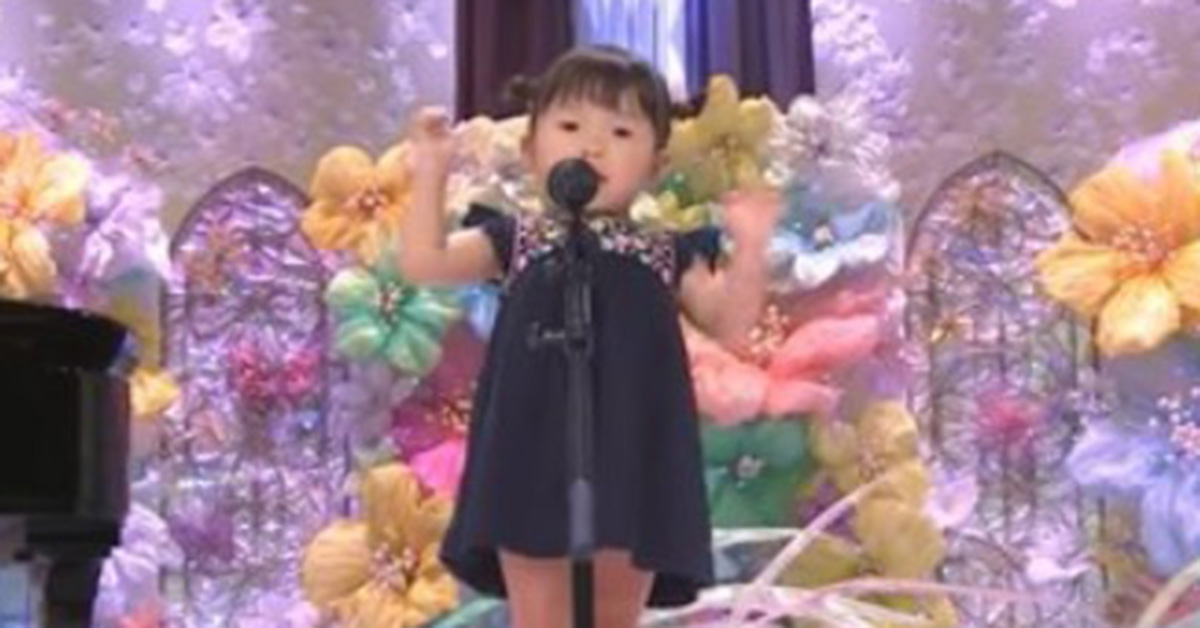A malicious comment that goes beyond the road towards Nonoka Murakata (2), a Japanese child who became a hot topic with a dance video after receiving a silver prize from a Japanese nursery rhyme contest is controversial. There are voices of concern as indiscriminate accusations against children who have become famous through media exposure have been repeated.

Nonoka Murakata (2), who gained a lot of attention with the video of the “Silver Prize at the Japanese Children’s Song Competition,” announced a legal response to malicious comments directed at his family. YouTube capture
“Do you have udon in Korea?” Criticism
Nonoka received a silver award at a nursery rhyme contest held in Japan last November. The video of the contest spread to social network services (SNS), and it received more than 8 million YouTube views. As the popularity increased in Korea, Miss Nonoka’s parents created an official Korean SNS account and uploaded a video of Miss Nonoka learning Korean.
In an interview with the media, Mr. Nonoka’s parents said, “I want to bring Nonoka to Korea to show the warmth of people.” However, as social media activities increased, it became the target of some netizens. The problem was that her parents uploaded a video of Miss Nonoka eating udon and said,’Do you have udon in Korea?’ Malicious comments toward Nonoka, such as’treating Korea as an underdeveloped country’, spread.

A netizen posted an article on the online community stating that the parents of Nonoka Murakata recently apologized to the social network service (SNS) for his remarks. Online community capture
“Get off the dirty Japanese”… Bad comments on a two-year-old child
On the 17th, Nonokayang’s official Instagram account manager in South Korea announced that it would take legal action against malicious comments. According to the published article, malicious comments such as “Beg for gifts from Korean fans” and “Stop dirty Japanese” or a direct message came to Nonoka. Nonoka’s side appealed, “I’m a child and I’m singing because I like myself, so please look at me pretty.”
Online, opinions clashed over malicious comments. Some netizens said, “It’s too bad for a 2-year-old child,” “Professional inconveniences interpreted it negatively.” Instead, I apologize.” On the other hand, there were opinions that “if I play YouTube, I keep coming out and I get rejected” “I hate it because it’s not like a child” “Japanese people are over in Korea”.

‘Tye’, an elementary student YouTuber who started YouTube in 2018, gained popularity as a sea grape ASMR. Thiye suffered from malicious comments and various malicious reports, and at one time stopped her activities. YouTube capture
There has also been a controversy in the reckless criticism of children who have become famous. Malicious comments directed at’Kids YouTuber’ are a prime example. Elementary school student’Tye’, an elementary student YouTuber who started YouTube in 2018, gained great popularity by uploading ASMR for eating, such as’Eating Sea Grape’ and’Eating Dongchimi Radish’.
However, on the YouTuber of Thiye at the time, comments containing various swear words and sexual insults, such as “Young X should not taste money.” Thiye even closed the comment window and once announced the suspension of activities.
An uncomfortable gaze such as anti-Japanese emotions is compounded
Regarding the cause of malicious comments toward child stars, cultural critic Chung Deok-hyun explained, “There are gazes that are uncomfortable about becoming famous at a very young age.” Regarding the case of Nonoka, he said, “An anti-Japanese sentiment was projected,” he said. “The cultural differences caused by different nationalities caused communication problems and malicious comments worsened.”
Ik-joong Jung, a professor at Ewha Womans University’s Department of Social Welfare, pointed out, “In the case of children, problems may arise due to the influence of malicious comments or depression when self-identity is formed.” He added, “Unlike adults who have the power to endure, children who experience bad comments at an early stage have room for further hurt or extreme interpretation of negative content.”
Reporter Ham Min-jung [email protected]
